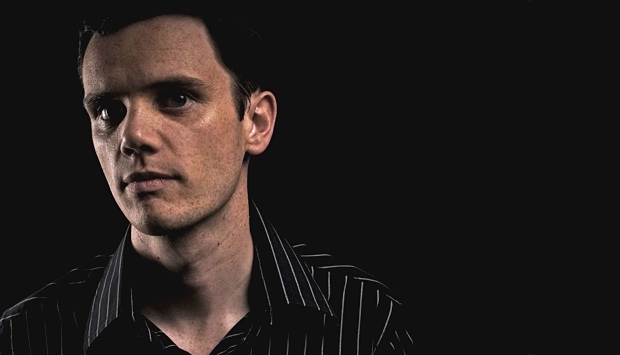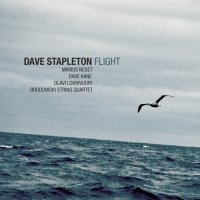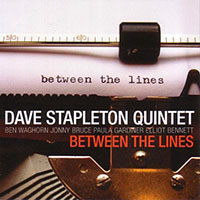Home » Jazz Articles » Interview » Dave Stapleton: Edition Records Takes Flight
Dave Stapleton: Edition Records Takes Flight

I'm a great believer in trust and loyalty. If there's trust there, on both sides, then that's enough. I'm friends with these people as well; it's not just a business relationship. We're all working for the same cause.
Stapleton graduated from the Royal Welsh College Of Music And Drama in 2002, with a degree in classical piano. After graduation, he embarked on a musical career that has drawn on classical music and jazz but has stayed resolutely away from neat or easy categorization. He established the Dave Stapleton Quintet in 2004 and has released three albums with that band. He's also collaborated with many other musicians including pianist Matthew Bourne, on Dismantling The Waterfall (Edition Records, 2008), and composer/sound designer Deri Roberts, on The Conway Suite (Red Eye Music, 2005).
As if his burgeoning career as a composer and musician wasn't enough, Stapleton and his business partner, photographer Tim Dickeson, decided to establish a record label. Edition Records came into being in 2008: Stapleton and Bourne's Dismantling The Waterfall getting the label's first catalog number, EDN1001. Since that first release, Stapleton and Dickeson have built up an impressive roster of over 30 albums from acts including Phronesis, McCormack and Yarde Duo, Marius Neset—a featured player on Flight—and Troyka. The label has also re-released three of Stapleton's earlier albums. Stapleton and Dickeson have taken charge of marketing, distribution, artist development and a host of other activities that are vital to the health of a record label. As Edition Records grows and develops, Stapleton continues as its Artistic Director, but his own musical career as a composer and performer also continues apace.
The Genesis of Flight
Flight is one of Stapleton's most ambitious projects so far; indeed, for many composers it would be a project that demands full-time concentration. How does it fit with running a record label? Stapleton doesn't downplay the difficulties in juggling the two activities, plus everything else involved in the life of someone with a young family, but he does come across as someone with an impressive work ethic and an eye for the medium to long haul as well as the short term. Flight wasn't brought to fruition overnight, as he explained on the telephone from his home."I've always wanted to write for strings and a jazz quartet but I never felt that I had the ability," Stapleton recounts. "A lot of the time, when I'm writing, I have ideas that get put to one side, into a box, then when I'm getting a project together I'll look in the box and see what's there. So it's hard to say what came first. I knew I wanted to get something quite free and organic, blurring the improvised and the composed. I also knew the instrumentation I wanted. Once I knew the musicians who would be playing it was then a question of the music. I decided quite early on that it was going to relate to flight, to what has become the cover picture. Then it all came together: quite an organic process for once."
 Flight's cover picture, of an albatross soaring over a stark and unforgiving ocean, has an instantly recognizable link with many other Edition records album covers. There is a distinct house style that can be seen in the majority of the label's cover designs—a reflection of the fact that both Stapleton and Dickeson are accomplished photographers. The picture isn't a bespoke Edition photograph however; it was taken in 1974 during the Whitbread Round The World yacht race. Stapleton's father had taken part in two legs of the race, from Sydney to Southampton and the photo, taken by a fellow crew member, was part of the Stapleton family's collection.
Flight's cover picture, of an albatross soaring over a stark and unforgiving ocean, has an instantly recognizable link with many other Edition records album covers. There is a distinct house style that can be seen in the majority of the label's cover designs—a reflection of the fact that both Stapleton and Dickeson are accomplished photographers. The picture isn't a bespoke Edition photograph however; it was taken in 1974 during the Whitbread Round The World yacht race. Stapleton's father had taken part in two legs of the race, from Sydney to Southampton and the photo, taken by a fellow crew member, was part of the Stapleton family's collection. Stapleton may have gained inspiration from his father's adventure and the photograph, but he didn't start completely afresh when composing the music. "There are pieces on Flight that I wrote six or seven years ago, pieces that I didn't do anything with as they weren't right for my quintet or for anything else at the time. Most of Flight, around 60-70%, is new music. I wrote the piano theme on 'Henryk' in about 2006. I tried it out with the quintet but it never really worked. That's the oldest piece on the album."
The decision to bring together players from the classical and jazz worlds was there at the beginning, and brings a longstanding desire to fruition for Stapleton. "From the start I wanted a string quartet and jazz players. I trained as a classical pianist so classical music has always been a big part of my life. I met this group, the Brodowski String Quartet, by chance. They seemed right for the project and once they were onboard I started to find the jazz players."
What is it that makes the Brodowski String Quartet right? "Classical musicians and jazz musicians are worlds apart in the way they present themselves, their approach to music—even the way they hang out backstage," Stapleton explains. "I met the quartet when it came to a school where I teach, although it turns out that I was at college with the sister of Catrin Win Morgan, the second violinist. I gave the musicians some music I had already written, they took it away and tried it out and liked it. The chemistry just felt right. They're into contemporary East European music. So there were lots of reasons why I felt they would fit."
The serendipitous meeting with the Brodowski String Quartet reflects the positive nature of the project as a whole, as Stapleton says: "All along with this project things felt right. It's an important thing for me, how things feel. I'm very instinctive like that."

A Classical Musician Or A Jazz Musician?
While he's clearly adept at getting the best from musicians who are "worlds apart," Stapleton doesn't ally himself too strongly with either camp. "I don't see myself as a classical musician. The thought of going onstage night after night playing exactly the same notes terrifies me. From a composer's point of view I'm thinking on a much larger scale than most jazz composers do. So I don't see myself as either. I try not to pigeonhole myself. I don't see myself as a jazz musician: I don't play bebop; I don't play in lots of bands. I don't want to do that. I'm somewhere in the middle: a European improvising composer/pianist. Somewhere in between jazz and classical: but there's no terminology for that."
Is this not a tricky approach to self-definition for a musician? After all, people like labels. "Yes, they do," Stapleton affirms. "The music industry likes labels. But it's important to me that I'm not seen as a 'jazz musician.' It's important in terms of work: mention the 'jazz word' to film producers and they tend to walk the other way, seeing it as noodly and busy and full of saxophone solos—just not suitable for films. I'm trying to battle against that."
Many musician/composers would place themselves at the forefront of one of their own compositions. Stapleton doesn't do this, preferring a much more egalitarian approach that enables other players to stretch out and take the spotlight. "Yes, that's what I'm trying to create, a more democratic setup," says Stapleton. "When I leave space for improvisation I don't identify a section as 'saxophone solo' or whatever, I write 'quartet collective.' I think the musicians are aware of this. I chose the jazz players on Flight deliberately because they're composers as well; they bring that sensibility to shaping the improvisations."
Life As A Label Boss
As Stapleton develops his musical career, the reputation of Edition Records grows on an almost daily basis. Since its first release in 2008 it seems to have become very successful very quickly. What's the secret?"I think it's the relationship I have with the artists," says Stapleton. "I'm passionate about the label, I put a lot of time into it. I started out knowing what I would want from a label—I'm quite fussy about things like that. I would want to know how much is being sold, that my work was being pushed as hard as possible, so I try to give that to our artists. People seem to see something in that. Of course, without the artists and their music the label would be nothing."
But it's the people on the label who select the artists, so Edition succeeds because Stapleton selects the right musicians and helps them to succeed. How are Edition's artists selected? "Firstly, I have to love the music," Stapleton explains, "secondly, it's down to the artists, the way they are, their self-belief, their goals. It also involves things like image, how can we promote them, are they touring. A lot of early Edition records were great artistically but didn't make money. They still added value to the catalog, but we can't do that now, we have to make money on every release. So I'm slightly pickier about what I do.
"We are in the position of releasing the second or third albums from some of our acts, like Phronesis and Troyka. We all know each other really well, we know how we work. We're talking long-term goals rather than just the next album: it's a nice situation to be in. Phronesis and Marius Neset have got to the position where they're touring a lot in Europe and selling a lot of CDs, so in some ways it gets easier; in others it makes more work. The more successful they become the more there is to do.

"Mostly we sign acts for one album at a time," Stapleton continues. "But I'm a great believer in trust and loyalty. If there's trust there, on both sides, then that's enough. I'm friends with these people as well; it's not just a business relationship. We're all working for the same cause. To keep those bands I have to do my best in selling lots of CDs for them across lots of different countries."
For Edition Records, like any other niche label, survival and growth are heavily dependent on success in an international marketplace. Interestingly, while Edition is based in the UK Stapleton doesn't view Britain as one of the most critical markets. "The UK is a key market in the sense that we're living in it. But if we didn't live here I'm not sure that it would be a key market. The amount of units we sell here compared to Germany, with the same release and the same promotion, is nowhere near. I would guess we sell around four times as many CDs per act in Germany compared to the UK, even though there isn't a huge difference in population size. On the one hand, I think it's to do with culture: Germans and French are much more into the arts than the Brits are. The other thing is the structure of government funding to support specialist music—the UK offers next to nothing. There's a different mentality. As a label we put our energies into those territories because that's where there's a market, that's where we can make money."
Stapleton recorded Flight in Copenhagen. The decision was a pragmatic one and is perhaps another reflection of the state of the British music scene. "It was a practical choice more than anything. I was looking for a London studio, but to get what I wanted was ridiculously expensive. The engineer I wanted to use lives in Copenhagen and suggested we go over there. The studio was much cheaper. The total price, including flying the musicians in and putting them up in hotels, was cheaper than it would have been if we'd done the album in London. Also, we got to focus on the project for three days, rather than everyone going home at the end of each day, which was great for bonding. We got to rehearsal on the first day and I was the only person who'd met everyone else before. So the focus, going out to dinner after rehearsal, was great for the recording process."
Edition Records is also making plans for another market—a well-established market, but one that the label hasn't yet attempted to enter. Marius Neset's critically acclaimed Golden Xplosion (2011) is set to become Edition's first release on vinyl. Vinyl now accounts for a tiny proportion of sales of recorded music, but sales are currently increasing year-on-year, and there is clearly a committed fan base for the format. Stapleton is excited, but enough of a businessman to keep things in perspective.
"I think it is a growing market. People are definitely getting back into it," Stapleton says. "A very small number of people listen to really high quality systems, 24-bit recordings. Most people listen in the car or on iPods. As a label, we try to put across a message that we really like music. CDs are so common they get devalued. so we'd love it if we could do more, develop a market for vinyl. But it is expensive. The biggest thing for a small label is cash flow, but we'll keep on releasing quality product and connecting with that audience across the world. If we could do every Edition release on vinyl, that would be amazing."
Selected Discography
Dave Stapleton, Flight (Edition Records, 2012)Dave Stapleton Quintet, Between The Lines (Edition Records, 2010)
Dave Stapleton, Catching Sunlight (Edition Records, 2009)
Dave Stapleton and Matthew Bourne, Dismantling The Waterfall (Edition Records, 2008)
Dave Stapleton Quintet, The House Always Wins (Red Eye Music, 2007; Edition Records, 2008)
Dave Stapleton Quintet, When Life Was In Black and White (Red Eye Music, 2005; Edition Records, 2009)
Dave Stapleton and Deri Roberts, The Conway Suite (Red Eye Music, 2005; Edition Records, 2008)
< Previous
Reminder
Next >
Jazz And The City
Comments
Tags
For the Love of Jazz
 All About Jazz has been a pillar of jazz since 1995, championing it as an art form and, more importantly, supporting the musicians who create it. Our enduring commitment has made "AAJ" one of the most culturally important websites of its kind, read by hundreds of thousands of fans, musicians and industry figures every month.
All About Jazz has been a pillar of jazz since 1995, championing it as an art form and, more importantly, supporting the musicians who create it. Our enduring commitment has made "AAJ" one of the most culturally important websites of its kind, read by hundreds of thousands of fans, musicians and industry figures every month.






















